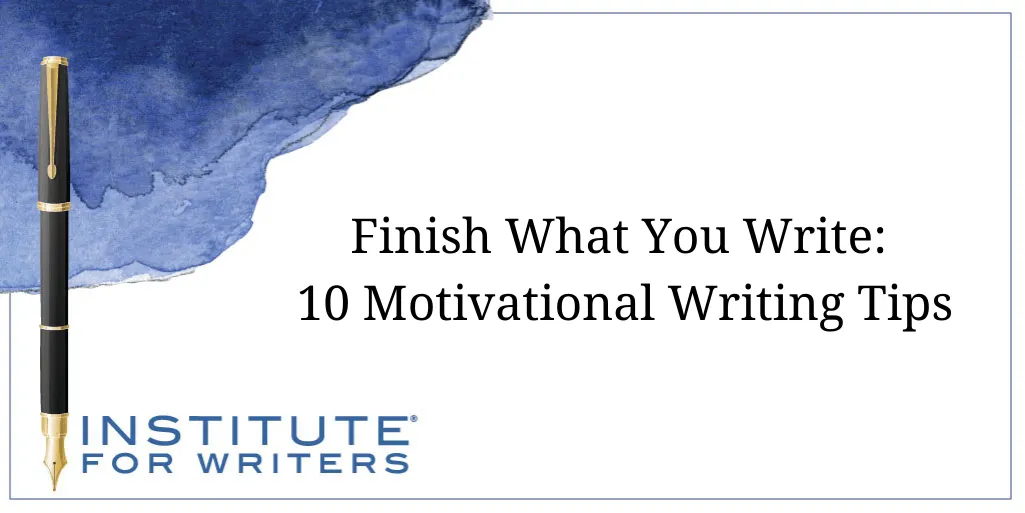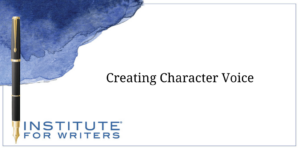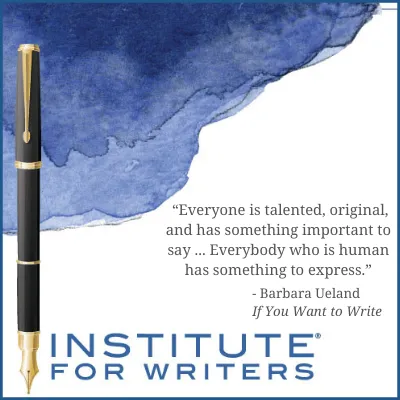
- Date: May 3, 2022
- Author: Victoria Sherrow
- Category: Writing for Adults Blog
- Tags: Ending, Inspiration, motivation, Novel, Time Management
We teach our students how to write and get published!
View our Course Catalog >
Finish What You Write: Top 10 Motivational Writing Tips
1. Picture the intrinsic benefits that come from finishing your project.
Completing our writing –or other tasks that matter—brings personal satisfaction, whereas unfinished business can produce feelings of guilt, inadequacy, and failure. Finishing a big task sparks pride and boosts our confidence that we can tackle challenges and reach goals. We feel energized, as if that proverbial weight has been lifted. A completed piece of writing also confirms one’s identity as a “real writer.” Moreover, the process fosters growth and learning, developing our writing “muscles” in ways that can help in future projects. We may also gain more confidence to send out queries and accept writing assignments. If we completed such a project once, we can do it again, right? 2. Remember why you began this project.
2. Remember why you began this project.
You probably started your book with enthusiasm and energy, but something happened along the way, and now you feel stuck or uninspired. This happens to other writers, too, as they make their way through a long project. Try to recapture that initial spark. Think about why you wanted to write your book and what it meant to you. Think about how it might benefit readers.
3. Imagine how you would feel if someone else writes ‘your’ book first.
Maybe you have an idea for a fascinating biography, or you’ve planned an adventure plot that seems unique. Then you discover in a writer’s magazine that someone else just sold a book with the same subject matter. Ouch—this has happened to me and other authors I know. It’s frustrating, especially if you’ve been thinking about that book for a while and have even begun writing it. Knowing that other authors might develop the same idea can motivate us to finish ours first.4. Say “no” to negative self-talk.
Does negative self-talk sabotage your efforts to keep writing? Your inner critic might be saying: “You aren’t talented,” “Editors will reject you,” “Readers won’t like your writing style,” “You aren’t as good as [author X].” Julia Cameron, author of The Artist’s Way at Work, discusses the fears that can hamper creativity, saying, “…you must disarm the snipers, traitors, and enemies that may have infiltrated your psyche.” Aim to replace disparaging thoughts with something positive and motivating. In If You Want to Write, author Barbara Ueland offers this uplifting perspective: “Everyone is talented, original, and has something important to say … Everybody who is human has something to express.” Imagine telling yourself: “I am talented. I am original. I have something important to say.”5. Gather up your courage.
Putting our work out there can be scary, and writers need courage. Many fear rejection and criticism, especially when they start out. Best-selling author Erica Jong once said, “I went for years not finishing anything. Because, of course, when you finish something, you can be judged.” It helps to remember that people will always have opinions, and different people can have utterly different opinions about the same book. Feedback of all kinds is part of the writing life. Author Eric Maisel offers these affirmations to help us cope: “Will they laugh at me? Let them laugh. I’ll write anyway.” And: “There are infinite ways to fail. So why worry? I’ll just write.”6. Find practical help and support.
If you cannot move forward on your own, consider a critique group or writing course. Feedback from others could help you resolve an issue in the manuscript that has kept you from finishing. Seeing a path forward makes it easier to get the job done. If you aren’t struggling with a specific issue but just haven’t pushed yourself to finish, a writing course or writing group can make you accountable to produce new pages on a regular basis.7. Remember that your draft is not set in stone and need not be “perfect.”
A perfectionist attitude can stand in your way. Instead of trying to be “perfect,” we can aim for the very best writing we can do at that point in time. This realistic goal can be motivating rather than intimidating. You can always revise and polish to improve your work. But do, at least, get that draft on the page.8. If you don’t have a deadline, set one anyway.
Professional writers who have a book contract or take on assignments have the external motivations of an editorial deadline and a paycheck. If you haven’t yet reached that stage, set your own deadlines and treat them seriously. Imagine that an editor or agent is waiting for your work. Schedule times when you will sit, write, and finish your book.9. Look forward to a new project you are eager to start.
Many writers say they are more likely to finish their current project when an interesting new project lies ahead. They see the next project as a sort of reward for completing the current one. (But first things first…)10. Celebrate when you reach the end.
You’ve worked hard to do something special—you finished your book! As you pursued your goal, you might have planned ways to celebrate or reward yourself. Take pride in your achievement and enjoy the moment. But write again soon. Like an athlete who just finished the race, game, or match, you want to keep “training” and using those skills you’ve developed. Finishing your manuscript can be challenging, but it brings many intrinsic rewards along with the chance for extrinsic rewards—publication, payment, a growing career, and the opportunity to reach readers with your writing. Sound good? It’s up to you. Get motivated and savor the joy of crossing that finish line.Related Links
Victoria Sherrow has published short stories, articles, poetry, and books (fiction and nonfiction) for readers aged preschool through adult. Her books have received starred reviews and been honored by the American Library Association, Parents Choice Gold Award, National Association for the Advancement of Science, and NYPL Best Books for the Teenage, among others. Victoria has taught at The Institute of Children’s Literature for more than 25 years and has also been an assistant editor and writing contest judge.

Creating Character Voice
Your readers should sense the subtle (and not-so-subtle) differences between the character voices in the stories you write. Try these exercises today!

Finding Your Author Voice
Your author voice has a unique and specific makeup. The way your word choice, writing style, tone, and perspective all make your voice unique to you.

Convey Emotions Through Dialogue
Dialogue is a powerful tool for conveying emotions. To write emotional dialogue that rings true, use these pointers from IFW Instructor Victoria Sherrow.
Become a better writer today
1000 N. West Street #1200, Wilmington, DE 19801
© 2024 Direct Learning Systems, Inc. All rights reserved.
1000 N. West Street #1200, Wilmington, DE 19801
© 2024 Direct Learning Systems, Inc. All rights reserved.
1000 N. West Street #1200, Wilmington, DE 19801
© 2024 Direct Learning Systems, Inc. All rights reserved.

 2. Remember why you began this project.
2. Remember why you began this project.






3 Comments